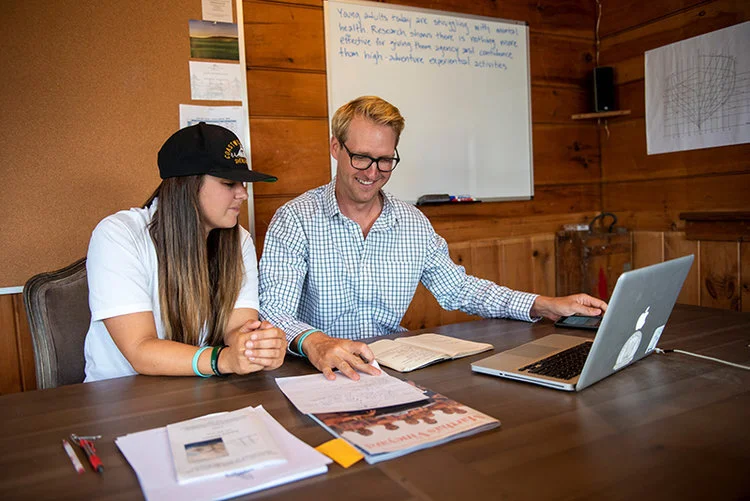MV Times
Learning By Doing
FUEL uses sailing ships as an unparalleled tool for education.
By Abby Remer – August 7, 2019, MV Times
Something new is afloat. While the Black Dog Tall Ships will continue to run the education programs for all Island schoolchildren, an exciting new opportunity will be available onboard a historic topsail schooner designed by Bob Douglas, master and designer of the Shenandoah.
At its core, the Foundation for Underway Experiential Learning (FUEL) program will be a developmental adventure targeted at 32 students from high school, college, or those heading into trade school, mainly from the Cape and Islands. Executive director and co-founder Ian Ridgeway and Casey Blum, LCSW, MS, FUEL’s co-founder and program director, recognized that there is a gap in services for this age demographic on Martha’s Vineyard, and are aiming to fill it by providing programming that is intentionally designed to help young adults transition into adulthood.
These young people, like those who went to sea during the great whaling era, will venture out on the open seas to learn by doing. The experiential curriculum was designed around three education pillars: personal development, environmental stewardship, and maritime heritage. They provide the framework that allows FUEL’s staff to carry out the organization’s mission of showing learners how to engage with the world in meaningful ways. The program, currently in the fundraising stage, will be the first to combine study abroad and experiential learning on a historical sailing ship.
During the ocean voyages, students and 12 crew, who will be trained to execute the curriculum, will be divided into three watches, following the traditional schedule of working four hours followed by eight hours off. While on watch, they will learn how to steer, navigate, handle sails, and climb and work aloft, as well as sailmaking, rigging work, conducting engine room checks, working in the galley, and more.
“Seamanship and navigation are a core class that would be offered on every trip,” Ridgeway says. “For instance, one of the essential things would be three or four basic knots you would have to know to use rope effectively. Everyone needs to know points of sail. But that shouldn’t even be hard, because these things are so integral to the experience that they’re going to know them anyway.
“Academic classes such as what creates the trade winds that are driving our sailing ship and how have they impacted human history would also be taught, as well as marine biology, astronomy, maritime literature, weather, and climatology.”
Unlike their counterparts from an earlier era though, FUEL’s educational methods will also include structured dialogue, group discussion, writing, reflective journals, and demonstrations.
The curriculum was developed in-house by Blum and overseen by FUEL’s academic committee, which consists of educators Dr. Dan Garvey, Dr. Michael Gass, Dr. Anita Tucker, and Dr. Harry Dickerson.
The academic classes will be taught onboard, but because they’ll be traveling to places like France, Italy, Spain, Africa, and the Caribbean, students will also enjoy sightseeing, cultural exchanges, snorkeling, swimming, and more. Not a bad way to spend a semester — and all available for college credit.
“Our program has been designed to surpass the accreditation standards set by the Association for Experiential Education (AEE),” Blum explains. “Experiential education is a teaching philosophy in which educators purposefully engage learners in direct experience and focused reflection in order to increase knowledge, develop skills, clarify values, and develop people’s capacity to contribute to their communities. In addition to this accreditation, FUEL will partner with a school of record that will award up to a full semester of college credit.”
Ridgeway emphasized, “The core essence of the program is personal growth. We’re trying to make sure that transformative experience is happening for as many students as possible. Students will develop critical thinking, communication, and problem-solving skills onboard the ship that we’re really focusing — inter- and intra-personal relationships. I want people to know how positive the outcome from this program is going to be, and understand how much kids are struggling and need something like this outside of school that can give them a positive outlook on the world and help them live a meaningful life.”
“My life and Casey’s were changed by working on ships,” Ridgeway told me. “I had to take some time off between high school and college, and it had such a positive experience on me. Especially here on the Island, I think our young adult population is really underserved. There’s not a lot for kids after high school. I think we can help them get on a positive track. Even more interesting than that is historically how kids from the Island would become adults. They went to sea to broaden their horizons. To learn leadership [to bring] back to the Island community. I think it’s even cooler that we can go back to our roots. Sometimes the answers are right there in the past.”
FUEL is in the fundraising phase now, and many of those they talk to say that they’d like to do the program themselves. They may not need the college credit, but Ridgeway says they could still do the trip and participate in the program.
“I think it would be awesome to have older people and younger people together, sharing life experiences, both new and already experienced,” says Ridgeway. “Don’t get distracted by the ship. Our mission is not taking learners sailing. That is our program, our method. Our mission is making them thrive as adults.”
For information about the program, visit buildtheship.org/program. For information about upcoming events, see buildtheship.org/events.

